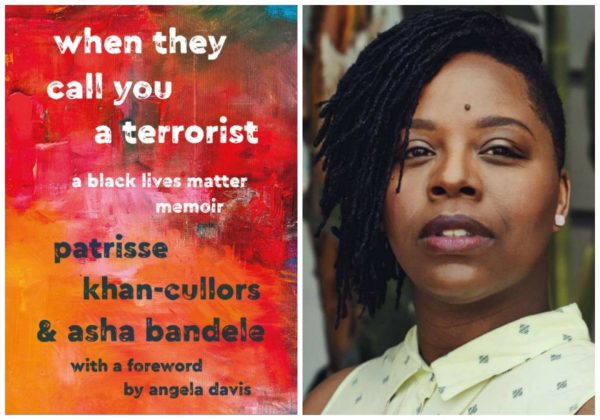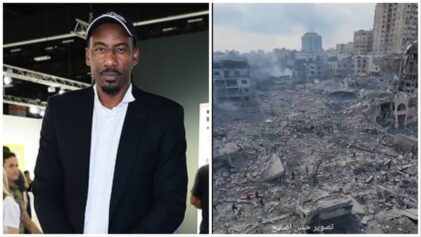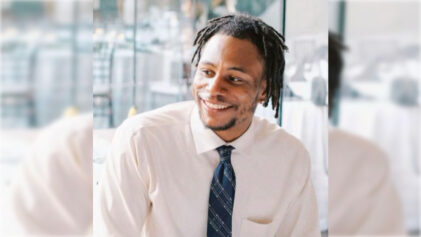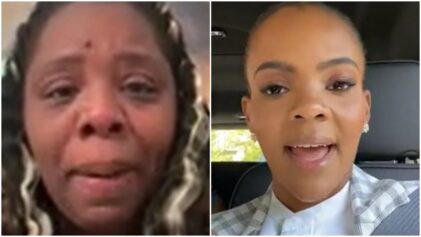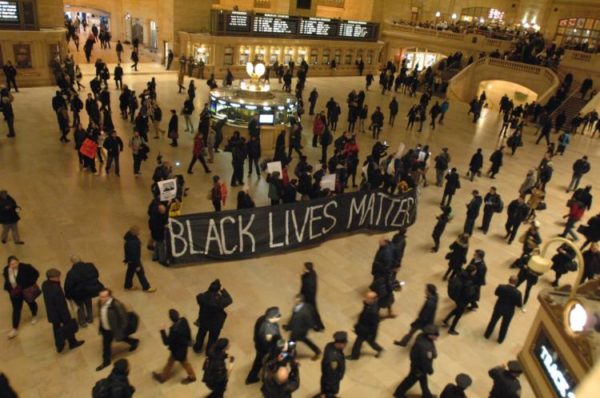
The new “Black Minds Matter” course will be open for enrollment in October. (Photo by SAM COSTANZA/FOR NEW YORK DAILY NEWS)
In Shakespeare’s “Twelfth Night,” the character Malvolio said, “Some are born great, some achieve greatness, and some have greatness thrust upon ’em.” If you substitute the word “greatness” with “activism,” that aptly explains the arc of activism and community involvement that has been so much a part of Patrisse Khan-Cullors’ life.
Khan-Cullors said her activism began in childhood. The California native has, for much of her young life, been at the forefront of activism in her home city and other parts of the country, beginning as a little girl when she became aware of the disparities between blacks and whites and pervasive police brutality visited on black and brown people.
One of the most poignant aspects of her story is the vulnerability she and others experienced.
“The mass incarceration of first our fathers and later our mothers made our lives entirely unsafe,” she wrote. “There were almost no adults who were there, present to love and nurture and defend and protect us.”
In a 2014 interview, Khan-Cullors told this reporter that her activism was rooted in the belief that Black people can’t wait on the state to take care of our Black lives. Her activism, she said, is fueled by a desire to create safe spaces and provide an array of opportunities for Black men, women and children to grow and develop.
“We have to show up now to build the world we want to see,” she said before she traveled to Ferguson, Missouri, where with the help of New York writer and activist Darnell Moore, she helped coordinate national freedom rides on a Labor Day weekend that brought hundreds of activists from cities as varied as Los Angeles, New York, Boston and Chicago to protest the police shooting death of 18-year-old Michael Brown. “There needs to be a reinvestment back into our communities. That’s what activists and other organizers I’ve been talking to and meeting with have been discussing.”
Khan-Cullors, 34, is most well known as a co-founder, with Alicia Garza and Opal Tometi, of Black Lives Matter, the global social justice organization created five years ago. She is on a national book tour to publicize her new book “When They Call You a Terrorist: A Black Lives Matters Memoir,” co-written with author and activist asha bandele. In it, Khan-Cullors speaks poignantly and with searing honesty about growing up poor and oppressed in Los Angeles. When asked who she wrote the book for, Khan-Cullors was clear.
“This is a coming-of-age story for young black girls,” she told Atlanta Black Star. “I wanted to challenge the idea that only way to be successful is to abandon our neighborhoods and work for corporations. There are young women who stayed in the community. I feel honored to be a part of the tradition of resistance and the civil rights movement, but it’s been exhausting.”
Khan-Cullors added, “I would describe it as important and necessary to bring some of these stories together about the larger society generally, and explore the war on drugs on Black families.”
In her childhood, Khan-Cullors recalls, police officers from the Los Angeles Police Department were a constant and menacing presence in her Van Nuys community, more occupying force than vehicle of service to residents. She was arrested for smoking weed when she was 12, and several of her family members also got entangled in the criminal justice system, including her father and a brother who, while struggling with mental illness, she said was brutalized by police and ended up behind bars.
“I witnessed consistent policing, militarized policing. I witnessed the impact mass incarceration had on my family members,” she told host Amy Goodman during a Jan 16 interview on “Democracy Now!” “The most early memories for me were my home being raided by LAPD and LAPD lighting up my siblings and their friends, at 11, 13 years old, stopping and frisking them. And this became our normal in our neighborhood, even though I knew it was not normal.”
“I could feel the humiliation in every stop, in every moment LAPD was around. I could feel the impact it had on my mother. I could feel it in our community. And I knew that we shouldn’t be living this way. I knew that there was more for us.”
Going to a mostly white school allowed the young Khan-Cullors to see the distinct differences between how Black and white children were treated, she said.
These experiences led Khan-Cullors, a social activist, organizer and artist, to confront the U.S. power structure and demand police accountability, the end to state-sanctioned murders of primarily unarmed African-Americans and people of color, sensible alternatives to mass incarceration and the provision of mental health services for affected individuals, as opposed to jails.
Khan-Cullors, director of truth and reinvestment at the Ella Baker Center for Human Rights in Oakland, said local, county, state and federal government have routinely dis-invested in Black neighborhoods and communities of color for decades. One solution, she argues, is re-investment in quality health care, education, jobs, food and shelter. But that won’t happen without concerted pressure from those most affected and by electing radical politicians to seats of power.
“Communities of color and poor communities in particular have been completely divested from,” she said. “We have very little infrastructure to access healthy food, jobs, shelter, a quality education, and so on.”
Khan-Cullors’ recognition of the importance of reinvestment has led to her involvement in projects aimed at forcing elected officials, law enforcement and government entities to reimagine what reinvestment might look like. For example, she spearheaded and partnered with more than 30 organizations last year to launch JusticeLA, a human rights and abolitionist coalition which has coalesced around stopping a proposed $2 billion plan to expand the jail in Los Angeles County. Last fall members of the coalition demonstrated in front of the Kenneth Hahn Hall of Administration just ahead of the weekly Los Angeles County Board of Supervisors meeting.
“The role I play is coordinator — bringing people together to challenge the $3.5 billion jail plan — and reallocate(ing) that money into community-based solutions,” she told a Complex Magazine reporter. “The lead coalition members are Dignity and Power Now, a local grassroots organization that has been doing a lot of amazing work around challenging the issues of jail violence. We also have YJC [Youth Justice Coalition], which is a youth-led organization.”
According to data provided by Khan-Cullors, Los Angeles County has about 17,000 prisoners behind bars, with 80 percent of them Black and Latino. As many as 60 percent of the inmates in L.A. County jails are there because they’re poor, and have not been convicted of any sort of crime, Khan-Cullors said.
“We can’t jail ourselves out of these problems, but what we can do is get people access to jobs so they’re not stealing,” said Khan-Cullors.
She said Los Angeles residents need mental health care services, with some suffering from PTSD or severe mental illness, and access to housing to combat homelessness.
“They are very simple answers, but the question for our county is, ‘Do you want to do it?’” she asked.
To date, Khan-Cullors said, the protesters haven’t been able to convince city leaders to accede to any of their demands or redirect the trajectory of the planned project, but she said she remains committed and mindful of the power of collective voices, as evidenced by the growth of the Black Lives Matter movement.
Khan-Cullors, a queer woman and 2012 Fulbright Scholar, continues to travel widely, lecturing and receiving accolades and awards for her organization and activism and her association with the Black Lives Matter movement.
She recalls that Black Lives Matter (#BLM) started with a simple love note online, despite the fury and grief she, Tometi and Garza felt after an all-white jury in Sanford, Florida, acquitted Trayvon Martin’s killer, George Zimmerman, of manslaughter and second-degree murder charges.
She said she sees #BLM as the next-gen manifestation of the Black Panther Party and the modern civil rights movement led by Dr. Martin Luther King Jr., shaped by those who came before, and she asserts that she and her compatriots are just as resolute and energized to take the Black liberation struggle to the next level.
One thing that can’t be denied, she said, it that #BLM has forced Americans to look squarely at the fallout from America’s original sin, slavery, and is coaxing them not just to come to terms with the issues of race and the continued criminalization and oppression of Black people, but also to commit to dismantling the system.
In her newly-released memoir “When They Call You a Terrorist”, Khan-Cullors, a new mother, spoke about the purpose behind those actions, and the goal of making folks outside of the movement uncomfortable or inconvenienced in the service of the #BLM cause.
“I just wanted folks to take a moment and just feel what this must be like for a community that experiences this on a daily basis,” Khan-Cullors said.
“We deserve what others have taken for granted,” Khan-Cullors also wrote.
